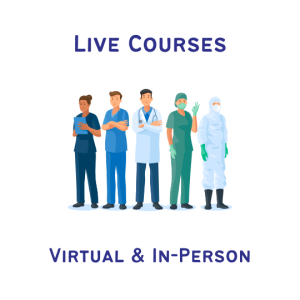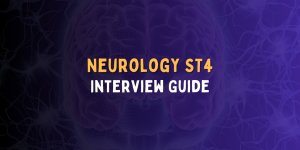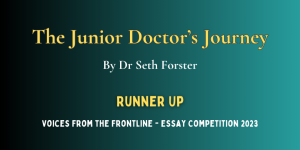
Published February 9, 2024 | Updated May 29, 2024
By Dr. Ifrah Akbar
Ifrah, meaning ‘joy’, finds happiness in everything she does! Whether it’s reading manga, watching anime/TV shows, or studying medicine – she holds her passions quite close to her heart. A happy-go-lucky individual who wants the best of everything!
The Radiology ST1 interview represents a critical juncture in the career path of aspiring radiologists. This article aims to navigate prospective Radiology ST1 candidates through the nuances of the interview process.
From understanding the competitiveness of the field to dissecting the interview format, this guide is an all-encompassing resource. It is specifically designed to equip you with the knowledge and confidence needed to excel in your Radiology ST1 interview!
We’ll walk you through:
Key Documents
Radiology Recruitment Timeline 2024
Check out changes to crucial dates during the selection process on the recruitment timetable.
| Vacancies published | Wednesday 25th October 2023 by 5pm |
| Applications open | Thursday 26th October 2023 at 10am |
| Applications close | Thursday 23rd November 2023 at 4pm |
| Invitation to MSRA | Tuesday 19th December 2023 |
| MSRA Exam | Thursday 4th – Tuesday 16th January 2024 |
| Evidence Verification Upload | Tuesday 13th to Monday 26th February 2024 |
| MSRA Results | During week starting 5th February 2024 |
| Invitation to interview | Wednesday 21st February 2024 (though some speculate shortlisting will be on the 9th) |
| Interviews | Tuesday 12th to Friday 15th March 2024 |
| Programme Preferencing | Monday 26th February to Tuesday 10th March 2024 |
| Initial Offers out | By 5pm Tuesday 26th March 2024 |
| Post start date | Wednesday 7th August 2024 |
Radiology ST1 Interview Process
The process begins with an application through the Oriel system, where urgency is key as interview slots are allotted on a first-come, first-served basis. Once you receive your invitation via Oriel, quick action is necessary to secure your preferred time slot.
This interview is conducted entirely online using the Qpercom Recruit system, a browser-based platform designed for online interviews. Familiarising yourself with this system beforehand is highly recommended to avoid any technical hiccups on the day of the interview.
When preparing for the interview, it’s important to note that the process is standardised across England, Wales, and Scotland, offering a uniform experience for all candidates within these regions. However, in Northern Ireland the application and interview process differs slightly, necessitating tailored preparation strategies.
During the interview, you’ll be required to verify your identity, typically with a passport or UK photo driving license. Additionally, you’ll be asked to showcase your interview environment via your camera to ensure privacy and fairness in the assessment.
The interview includes two main stations, each lasting up to 10 minutes. These stations are designed to evaluate your commitment to the speciality and your communication skills. It’s an opportunity for you to demonstrate not only your intellectual grasp of radiology but also your ability to effectively convey your thoughts and interact within a professional setting.
To conclude the interview, candidates are expected to disconnect from the call, signifying the end of the process. Should you have any concerns post-interview, a window of one hour is provided to contact the PGDME support portal.
Tips For a Smooth Experience
How Competitive is the Radiology Interview?
The Radiology ST1 interview process stands as one of the most competitive in the field of medical specialisations, with a competition ratio of 8.77 in 2023.
If you’re through to the interview stage, there’s historically a ~50% chance of succeeding in getting a post, however, getting to this stage is becoming more and more competitive.
The demand for positions within this speciality has escalated significantly in recent years, following a global trend in increasing radiology applications, as well as being impacted by the inclusion of IMGs in round 1 applications since 2020.
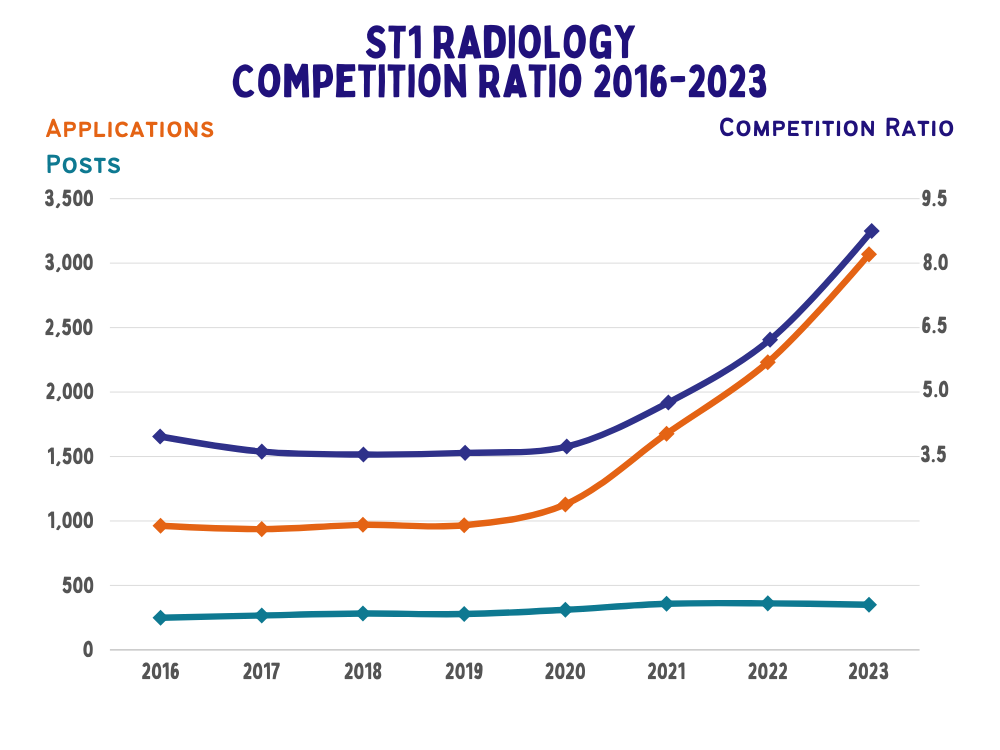
Statistical data from recent recruitment cycles reveals a striking insight into this competitive landscape.
For instance, in the 2023/2024 recruitment year, the number of applications received for Radiology ST1 positions significantly outweighed the available training posts (with almost 9 applicants per available post). This imbalance underscores the fierce competition for these roles.
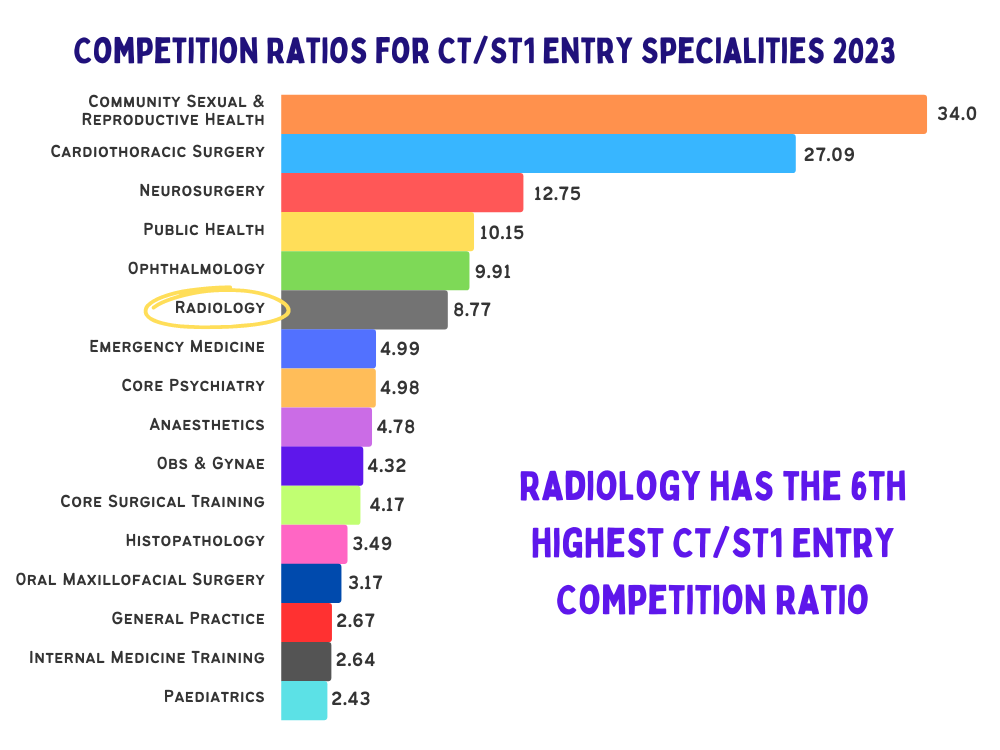
Recently, more people are applying for Radiology ST1. However, the number of interviews and available positions hasn’t increased.
Of the 3068 applicants for the 2023 start date:
This shows you that the major bottleneck is the MSRA exam, with 75% of those who take it not doing well enough to be shortlisted.

However, once you get to interview, the 50/50 chance of getting a post doesn’t mean it’s an easy ride. You’ll be competing against the top 20-30% of all applicants, so getting into the top half will still be challenging.
Interview Format
The Clinical Radiology ST1 interview has embraced the digital era by transitioning to an online format. This significant shift from the traditional in-person interview necessitates candidates being adept not just with their clinical knowledge but also with the technicalities of virtual communication.
The interview will take place between Tuesday 12th and Friday 15th March 2024 and are made up of two stations:
Commitment to Radiology – 10 mins(no longer used)Personal Skills – 10 mins(no longer used)- Prioritisation of Clinical Situations – 10 mins
- Speciality Skills – 10 mins
Update as of March 5th 2024 – this has changed last minute! Read more below.
You’ll first deal with an administrator for the initial checks, after which you will have an interview panel usually made up of two assessors.
Expect the whole interview to take at least 30 minutes, including identify confirmation and setup. You’re allowed to take notes, but these must be destroyed (gasp) afterwards.
Interview Changes 5th March 2024 – 2 New Stations
In what could be seen as the ultimate test of preparedness, the RCR decided to make a complete change to the interview 1 week before the start date…
There’s no information on the internet that we can find about this – even the HEE page hasn’t been updated – so you’ll have to use the info you got in your email update.

The two new stations are:
- A – Prioritisation of Clinical Situations
- 2 (yeah, 2, you read that right) – Speciality Skills
What does this mean?? We don’t know exactly.
RadCast has very helpfully written a blog on these two stations to help us understand a bit more about what they might mean. Thankfully, the new(est) format has some similarities with the 2015 format, which is covered here in the BMJ.
We won’t do it better than RadCast, so you better watch this video here:
Commitment to Radiology Station (No Longer Used)
Update March 2024: The commitment to radiology station is no longer being used – we will keep this here for future reference in case this changes.
At the ‘Commitment to Radiology’ station, candidates are probed on their dedication and enthusiasm for the field. This involves questions that not only assess academic prowess but also your passion for radiology, your understanding of its impact in healthcare, and long-term career aspirations.
Take a look at the person specification for clues on what might be asked.
Expect queries like:
The objective here is to articulate a comprehensive perspective that reflects both your intellectual curiosity and practical insights into what a career in radiology involves.
Within this, you can demonstrate your commitment by presenting your experiences thus far including:
Your knowledge and understanding of radiology might also be tested, including what you know about:
Personal Skills Station (No Longer Used)
Update March 2024: The personal skills station is no longer being used – we will keep this here for future reference in case this changes.
The ‘Personal Skills’ station shifts the focus to interpersonal competencies, crucial for success in a collaborative and multidisciplinary field like radiology. This part of the interview assesses:
Questions in this station might include:
This station is pivotal in determining your ability to integrate into the radiology department, where collaboration with other healthcare professionals is routine.
You’ll need to keep on top of various topics that might be explored here including:
Interview Scoring
When it comes to the radiology interview, HEE aren’t particularly apparent on how the interview is scored. We don’t have a mark scheme or an idea of how questions are weighted.
However, we do know how it’s all put togehtert by the end of the interview. To be offered a NTN in clinical radiology, you will be ranked alongside other applicants who have made this stage.
Your MSRA, self-assessment portfolio, and interview will all be considered in this final ranking with the following weighting:
Offers will be made based on your ranking and the number of available posts. Following that, if any of those who have been offered a post decline, the next person in their rankings will be offered a job.
Conclusion
Acing the Radiology ST1 interview is about being well-prepared, staying informed, and showcasing your passion for radiology.
Remember, it’s not just about knowledge, but also about presenting yourself confidently and effectively in a digital format. With the right preparation and mindset, you can navigate this competitive process successfully.
Good luck on your journey to becoming a radiologist!



